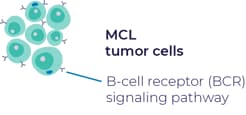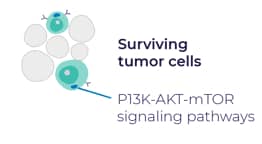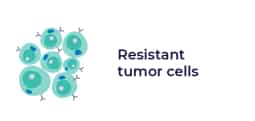How mantle cell lymphoma (MCL) tumors build resistance to the cancer treatment ibrutinib
October 2, 2019
Summary
This research looked at mantle cell lymphoma (MCL), a rare type of blood cancer. Researchers wanted to learn how MCL tumors develop resistance (no longer respond) to ibrutinib, a prescription medicine to treat MCL. They looked at 2 possible ways that MCL tumors could develop resistance:
- MCL tumors may use the cells around them to protect them from ibrutinib, called de novo resistance
- MCL tumors may find and use a new pathway to grow, called acquired resistance
What were the main results?
Researchers found that MCL tumors build resistance to ibrutinib through both de novo and acquired resistance:
- MCL tumors develop de novo resistance by using certain proteins to attach to nearby cells that protect them from ibrutinib
- MCL tumors build acquired resistance by using new pathways to go around the pathway that ibrutinib blocks
- Researchers also found that the pathway for both types of resistance connect, and blocking the pathways may overcome both types of resistance
When researchers combined ibrutinib with cancer drugs that block the pathways, they stopped the growth of resistant MCL tumor cells. Researchers suggest this offers a promising future treatment of MCL tumors that develop resistance and some similar cancers.
What did researchers study?
Researchers studied many complex molecules in and around MCL tumors that change and respond to ibrutinib. The MCL tumor cells used in this research came from patients who joined Total Cancer Care® (TCC).
What kind of research was this?
This was an observational study. Researchers looked at (observed) cancer tumor samples donated by patients who had joined TCC to learn more about how cancer works.
The results of this research alone should not be used to make health decisions. It takes many studies for researchers to confirm findings and use them in patient care.
Why was this research needed?
Researchers wanted to learn how mantle cell lymphoma tumors develop resistance to the cancer treatment ibrutinib. Mantle cell lymphoma (MCL) is a rare type of blood cancer that forms in B-cells (a type of white blood cell that helps fight infection). In MCL, B-cells grow and develop up in the lymph nodes (tiny, bean-shaped organs that contain the white blood cells that help fight off infections).
Ibrutinib is a prescription medicine that doctors use to treat MCL. While ibrutinib works quickly to shrink and stop the growth of MCL, many patients with MCL develop resistance to ibrutinib. Resistance means that the medicine no longer works. On average, 2 of 5 patients with MCL (43%) have tumors that have resistance to ibrutinib by 12 months of treatment. Patients with MCL usually live less than a year after a tumor develops resistance to ibrutinib.
In this study, researchers looked for the ways that MCL tumors develop resistance to ibrutinib to better understand how to overcome this resistance.
How do tumors build resistance to medicine?
There are 2 ways that tumors build resistance:
- De novo resistance: Tumor cells find protection in the area around them. Over time, tumors’ surroundings form a complex network, including blood vessels, proteins, and cells that the tumor uses to protect itself from the medicine.
- Acquired resistance: Tumor cells find and use a new pathway to continue to grow. The new pathway goes around the pathway that the medicine blocks. The medicine may stop most tumor cells, but cells that use the new pathway can continue to grow, sometimes stronger than before. Over time, only the tumor cells that use the new pathway remain and the medicine will no longer work.
What kind of research was this?
This was an observational study. Researchers looked at (observed) cancer tumor samples donated by patients who had joined TCC to learn more about how cancer works.
This kind of study can further cancer research aimed at developing new treatments, tailoring treatments to patients, and identifying a patient’s cancer sooner.
What happened during this research?
Researchers tested MCL tumor cells in a lab to learn how they develop resistance to ibrutinib. They ran tests to learn:
How MCL tumors developde novoresistance through the BCR signaling pathway
Ibrutinib works by blocking a protein in the B-cell receptor (BCR) signaling pathway. B-cells normally use this pathway to grow when fighting infections. MCL tumor cells use this pathway to grow quickly, without control. The researchers looked at the BCR signaling pathway to see if MCL tumors used it to develop de novo resistance.
How MCL tumors develop acquired resistance
Researchers grew MCL tumor cells and treated some with and without ibrutinib to see how they changed as they developed resistance to the drug. They looked for signs that MCL tumor cells used a new pathway instead of the BCR signaling pathway.
How de novo and acquired resistance work together
Researchers ran tests to compare MCL tumor cells with either type of resistance, as well as those with both types. The tests would help them understand if the 2 types of resistances worked together.
- Possible ways to overcome resistance to ibrutinib
Researchers treated MCL tumor cells with ibrutinib and 1 of 2 other cancer drugs. To learn if ibrutinib and 1 of 2 other cancer drugs could overcome the resistance and stop the growth of the cancer cells, they treated MCL tumor cells that had developed resistance to ibrutinib.
What were the main results?
Researchers found that MCL tumors develop both de novo and acquired resistance to ibrutinib. They also found a new possible way to overcome resistance to ibrutinib.
When researchers tested drugs that target the new pathway and combined them with ibrutinib, they stopped the growth of MCL tumors, even in tumors that built resistance to ibrutinib alone.
Other results
The researchers learned:
MCL tumors use the BCR signaling pathway to develop de novo resistance
MCL tumors use a protein in this pathway to attach to surrounding cells. Then, the surrounding cells protect the MCL tumor, which develops resistance to ibrutinib.
MCL tumors develop acquired resistance through new pathways called PI3K-AKT-mTOR
MCL tumor cells that developed acquired resistance to ibrutinib had higher levels of proteins connected to pathways called PI3K-AKT- mTOR. The researchers proposed MCL tumors may use the new pathways to develop acquired resistance by going around the BCR pathway that ibrutinib blocks.
De novo and acquired resistance work together
When the researchers looked at tumor cells, they found that the pathways for both types of resistance connect. This means that both pathways can strengthen each other, but it also means that a drug could block this new pathway to overcome both resistances.
2 other cancer drugs can help overcome resistance to ibrutinib
Researchers learned that ibrutinib combined with another cancer drug that blocks the PI3K-AKT-mTOR pathways can overcome resistance to ibrutinib. When they used ibrutinib with either of the 2 other cancer drugs on MCL tumor cells that had developed resistance to ibrutinib, the tumor cells stopped growing.
How has this research helped?
Researchers learned about ways that MCL tumors develop resistance to ibrutinib. This study also helped researchers identify a possible way to treat MCL tumors that develop resistance and other similar cancers.
READ THE ORIGINAL RESEARCH ARTICLE
Unification of de novo acquired ibrutinib resistance in mantle cell lymphoma





